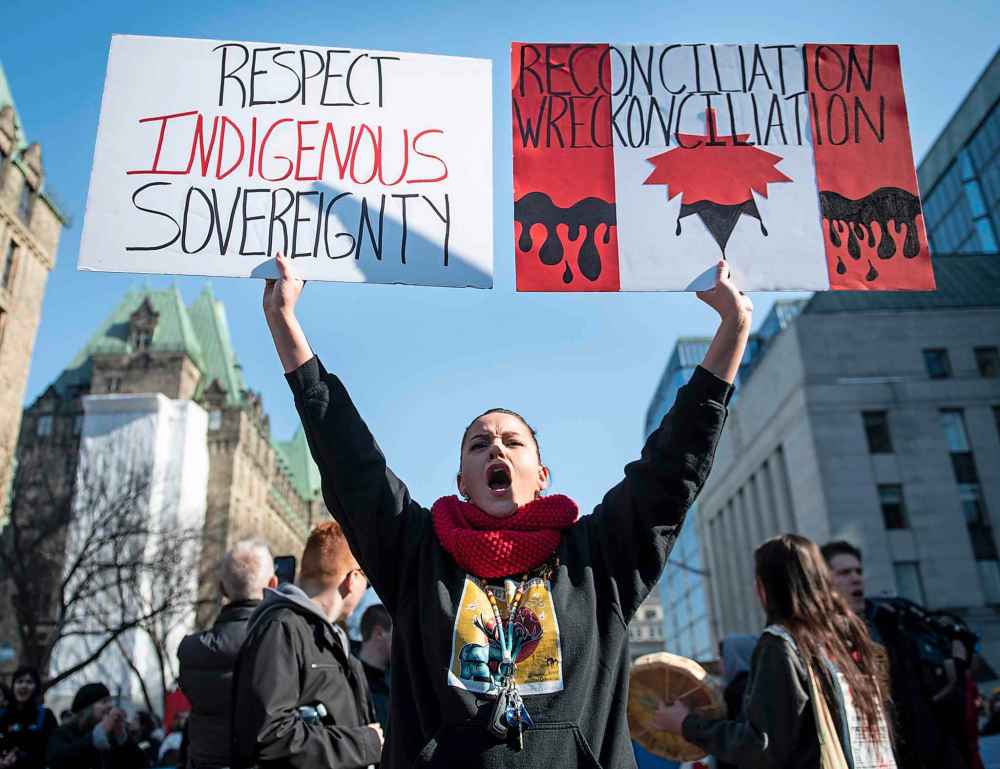Pipeline protesters should get honest about motives
Read this article for free:
or
Already have an account? Log in here »
To continue reading, please subscribe:
Monthly Digital Subscription
$0 for the first 4 weeks*
- Enjoy unlimited reading on winnipegfreepress.com
- Read the E-Edition, our digital replica newspaper
- Access News Break, our award-winning app
- Play interactive puzzles
*No charge for 4 weeks then price increases to the regular rate of $19.00 plus GST every four weeks. Offer available to new and qualified returning subscribers only. Cancel any time.
Monthly Digital Subscription
$4.75/week*
- Enjoy unlimited reading on winnipegfreepress.com
- Read the E-Edition, our digital replica newspaper
- Access News Break, our award-winning app
- Play interactive puzzles
*Billed as $19 plus GST every four weeks. Cancel any time.
To continue reading, please subscribe:
Add Free Press access to your Brandon Sun subscription for only an additional
$1 for the first 4 weeks*
*Your next subscription payment will increase by $1.00 and you will be charged $16.99 plus GST for four weeks. After four weeks, your payment will increase to $23.99 plus GST every four weeks.
Read unlimited articles for free today:
or
Already have an account? Log in here »
Hey there, time traveller!
This article was published 26/02/2020 (2113 days ago), so information in it may no longer be current.
Those staging demonstrations across Canada in solidarity with Wet’suwet’en hereditary chiefs in opposition to a natural gas pipeline in British Columbia should at least be honest about what they’re protesting.
So far, they haven’t had the guts to do so.
If those blocking rail lines and roadways, lighting fires and disrupting transit in major cities are doing so in support of the hereditary chiefs who are against the construction of Coastal GasLink’s pipeline, then they’re also opposing the 20 First Nations in the area that have signed off on the deal.
Yet, you won’t see any of the protesters with placards criticizing First Nations who have negotiated economic agreements with Coastal GasLink. That wouldn’t fit their narrative. They prefer instead to pretend that this is simply a David-and-Goliath battle between government and a large energy company on one side and an oppressed group of hereditary chiefs on the other. The issue is far more complex than that.

Anyone who’s paid attention to this issue knows by now there’s a jurisdictional conflict between hereditary chiefs and band councils along the B.C. coast. Hereditary chiefs have jurisdiction over their traditional land, which was never ceded to the Crown. That was confirmed in a 1997 Supreme Court of Canada ruling. Band councils, which draw their authority from the Indian Act, have jurisdiction over reserve land, but also claim to represent the broader interests of Indigenous communities in the area. The former say they were not properly consulted on the pipeline project. The latter signed economic agreements with the company that will bring jobs and economic opportunities to their communities.
Coastal GasLink consulted and negotiated in good faith with the band councils, but not with the hereditary chiefs, even though they should have. Hereditary chiefs say their proposals for an alternate pipeline route were ignored by the company. They also say the RCMP has no jurisdiction to enforce court injunctions on their traditional land.
It’s complicated. There are no clear villains or heroes in this story. Much of the information that has emerged in recent weeks is probably news to most Canadians. The hereditary chiefs are on sound moral and legal ground. But so are the chiefs and band councils who are looking out for the best interests of their people.
Protesters are taking sides in a jurisdictional conflict. They’re not just opposing Coastal GasLink, government or the RCMP. They’re opposing Indigenous communities that are proponents of the project.
Granted, governments should have worked out these jurisdictional issues with Indigenous communities long ago, probably through the signing of treaties. There’s plenty of blame to go around. Nevertheless, this is the mess that’s been left behind.
Standing up for the rights of one group of Indigenous people at the expense of another isn’t helpful (or honourable). It won’t solve anything. It’s no surprise that some Indigenous people from the affected area have said publicly that outsiders should mind their own business and stop protesting. The jurisdictional conflicts between hereditary chiefs (there isn’t agreement among them, either) and band councils is something they should work out on their own, without interference from others.

Many protesters probably aren’t aware they’ve taken sides in this dispute. Some probably believe this is a clear-cut case of government and Coastal GasLink trampling on the rights of Indigenous people, when it’s far more nuanced than that.
That doesn’t absolve them of their responsibility to be informed on the subject. If they’re not aware of the jurisdictional dispute, they should educate themselves. If they are aware of it and choose to protest anyway, they should be clear about what they’re opposing. They’re not just supporting the hereditary chiefs, they’re protesting a group of First Nations who believe the project will help pull their people out of poverty. By taking sides in the dispute, they want to deprive those communities of those economic benefits.
If that’s what they choose to protest, that’s fine; they can go ahead and do so (and be prepared to face arrest if their protests contravene court orders). But they should at least have the courage to stand up and be clear about what they’re opposing.
tom.brodbeck@freepress.mb.ca

Tom has been covering Manitoba politics since the early 1990s and joined the Winnipeg Free Press news team in 2019.
Our newsroom depends on a growing audience of readers to power our journalism. If you are not a paid reader, please consider becoming a subscriber.
Our newsroom depends on its audience of readers to power our journalism. Thank you for your support.

















